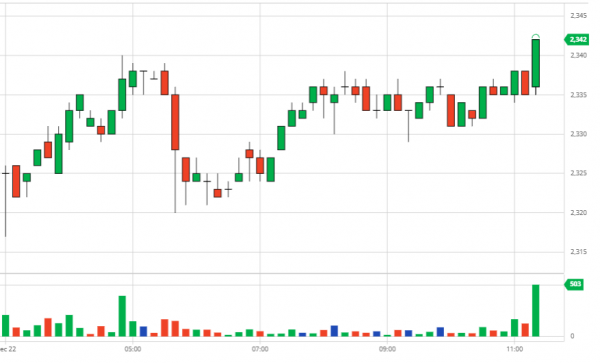USDX’s continued decline has supported investors to increase buying of commodities in general…

Robusta chart London 3/2022 session on December 22, 2021
At the end of the session, the price of Robusta coffee on ICE Europe – London continued to increase. The March spot term increased by $22 to $2,339 per ton and the May delivery term increased by $21 to $2,294 per ton, significant increases. Trading volume remain average. The island price structure stabilizes the gap.
Similarly, the price of Arabica coffee on the ICE US floor – New York has an upward trend. The March spot futures added 5.30 cents to 233.55 cents/lb and the May delivery futures added 5.20 cents to 233.40 cents/lb, strong gains. Trading volume remain average. The island price structure widens the gap.
The price of green coffee beans in the Central Highlands provinces increased by 200-300 VND, fluctuated in the range of 42,200 – 42,600 VND/kg.
The price of exported Robusta coffee, 2.5% black broken, stood at 2,044 USD/ton, FOB – HCM, with a deduction of about 240 – 250 USD/ton according to the May futures price in London.
The reais increased by 1.25%, the exchange rate rose to 1 USD = 5.6670 Reais after the Bank of Brazil’s move to continue injecting money to support liquidity in the context of a quiet market before Christmas and New Year. New Year. However, USDX’s continued decline has supported investors to return to the market to increase buying of commodities in general.
Coffee prices on the world’s two futures exchanges returned to high levels due to unresolved logistics problems in the short term and the inverse price structure was maintained, even though the coffee markets had just received good news. new.
According to news Bloomberg, the shortage of empty containers and no room on board has led coffee traders to re-establish a mode of transport that has been abandoned for more than 20 years. One shipment from Sumatra – Indonesia and one from Santos – Brazil are heading to ICE – Europe warehouses in a way “no containers”… Although the freight is much cheaper, the cost of unloading is very high because of the shortage of suitable workers and especially operations “Very complicated” from the domestic warehouse of origin to the receiving place at the destination due to lack of suitable equipment. Perhaps only to solve the immediate congestion, not to consider improving prices, according to the director of Cooxupé – Brasil, the owner of a shipment of 108,000 bags of Arabica coffee delivered to customers in Europe.
English (giacaphe.com)
